In this article, we dive into the essential types of Applied Behavior Analysis (ABA) assessments that every parent should know about to support their child's development. These assessments, like the ABLLS-R and VB-MAPP, are more than just tools; they offer critical insights into your child's unique needs and abilities. This understanding allows clinicians to craft personalized intervention plans that can truly enhance communication, social skills, and overall well-being.
Let’s explore this together! By familiarizing yourself with these assessments, you’re taking a proactive step in your child’s journey. Imagine how empowering it is to have tailored strategies that cater specifically to your child's strengths and areas for growth. It’s all about creating a supportive environment that fosters development and joy.
We’re here to help you every step of the way! Understanding these assessments can feel overwhelming at first, but remember, you’re not alone. Many parents share similar experiences and concerns, and by connecting with resources and professionals, you can find the support you need. So, let’s get started on this journey together!
Understanding your child's unique needs can feel like a daunting task, especially when it comes to navigating the complexities of autism. Many parents share this experience! The diverse range of Applied Behavior Analysis (ABA) assessment types offers a crucial framework for evaluating behaviors, skills, and developmental milestones. This ultimately leads to tailored interventions that can foster growth and independence.
But with so many assessment options available, how can you determine which ones are essential for your child's journey? 🤔 In this article, we’ll delve into ten vital ABA assessment types that every parent should know. Together, we’ll empower you to make informed decisions that can significantly enhance your child's therapeutic experience. Let’s explore this together!
At Rori Care, we understand the challenges parents face when it comes to their child's development. That's why we utilize extensive ABA assessment types to gather insights about a young person's behavior, abilities, and unique needs. This multifaceted evaluation process employs various ABA assessment types, enabling our clinicians to create personalized treatment plans that align perfectly with each child's strengths and challenges.
By prioritizing individualized approaches, we enhance the effectiveness of our interventions, leading to meaningful improvements in overall development and well-being. Studies show that customized treatment strategies in ABA therapy can significantly boost communication, social skills, and adaptive behaviors, ultimately fostering a child's growth and independence.
Did you know that ABA therapy has an impressive success rate of over 89% in supporting individuals with ASD? With an average effect size of treatment intensity for language skills at 1.85, our individualized planning ensures that every behavioral plan is tailor-made. We set clear, measurable goals for behavior change and skill development, which is so important!
Plus, our evidence-based strategies, combined with ongoing assessment and adjustment, guarantee that therapy evolves with the individual’s needs. Continuous monitoring is key to achieving optimal results, and we’re here to support you every step of the way.
With the integration of advanced AI, we also enhance the efficiency of our therapy by automating progress report generation, freeing up 50% more time for direct treatment. This holistic approach empowers caregivers with ABA principles and strategies, encouraging you to take an active role in your child's behavioral goals. Let’s explore this journey together!
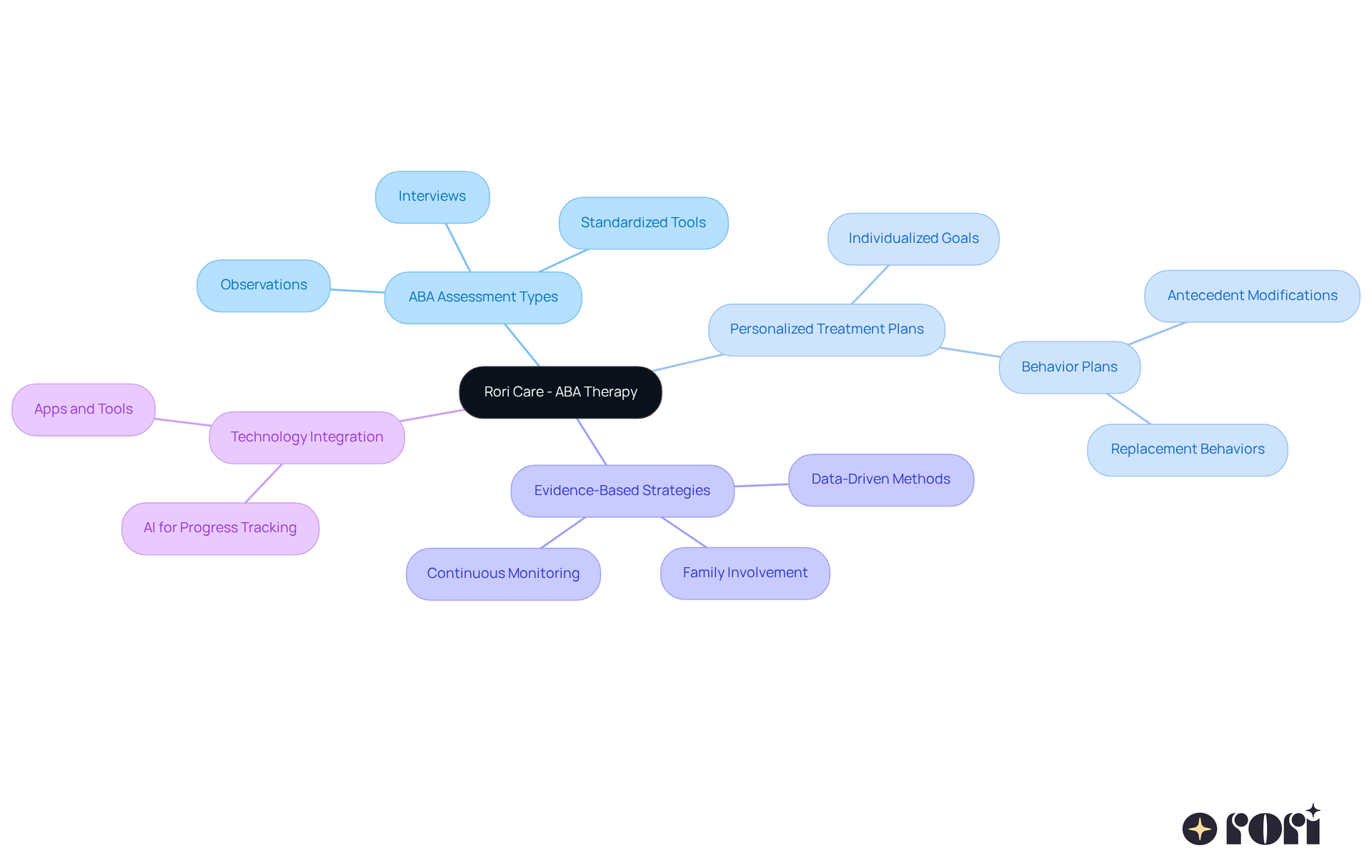
The aba assessment types, including the Assessment of Basic Language and Learning Skills - Revised (ABLLS-R), are essential tools for evaluating language skills in children with autism. It covers important areas like communication, social interaction, and self-care. By identifying specific needs, the ABLLS-R, among various aba assessment types, helps clinicians create targeted interventions that can really boost language development and learning outcomes.
You might find it interesting that tools like the ABLLS-R are increasingly recognized for their impact on effective language interventions. For instance, research shows that children who undergo ABLLS-R evaluations often see significant improvements in their communication skills, with many reaching average language proficiency by age 11. This really highlights the importance of early identification and intervention in supporting language growth.
Looking ahead, updates to the ABLLS-R in 2025 reflect new insights into language development in children with autism. These updates aim to make the evaluation process even more relevant and effective in addressing the unique challenges faced by these children. Speech therapists point out that using the ABLLS-R not only helps assess current language skills but also guides the design of interventions that can lead to meaningful progress in communication.
Overall, the ABLLS-R evaluation is one of the important aba assessment types that plays a crucial role in guiding both parents and clinicians. It offers a structured way to understand and improve language proficiency in individuals with autism. Let’s explore this together! We’re here to help you every step of the way!
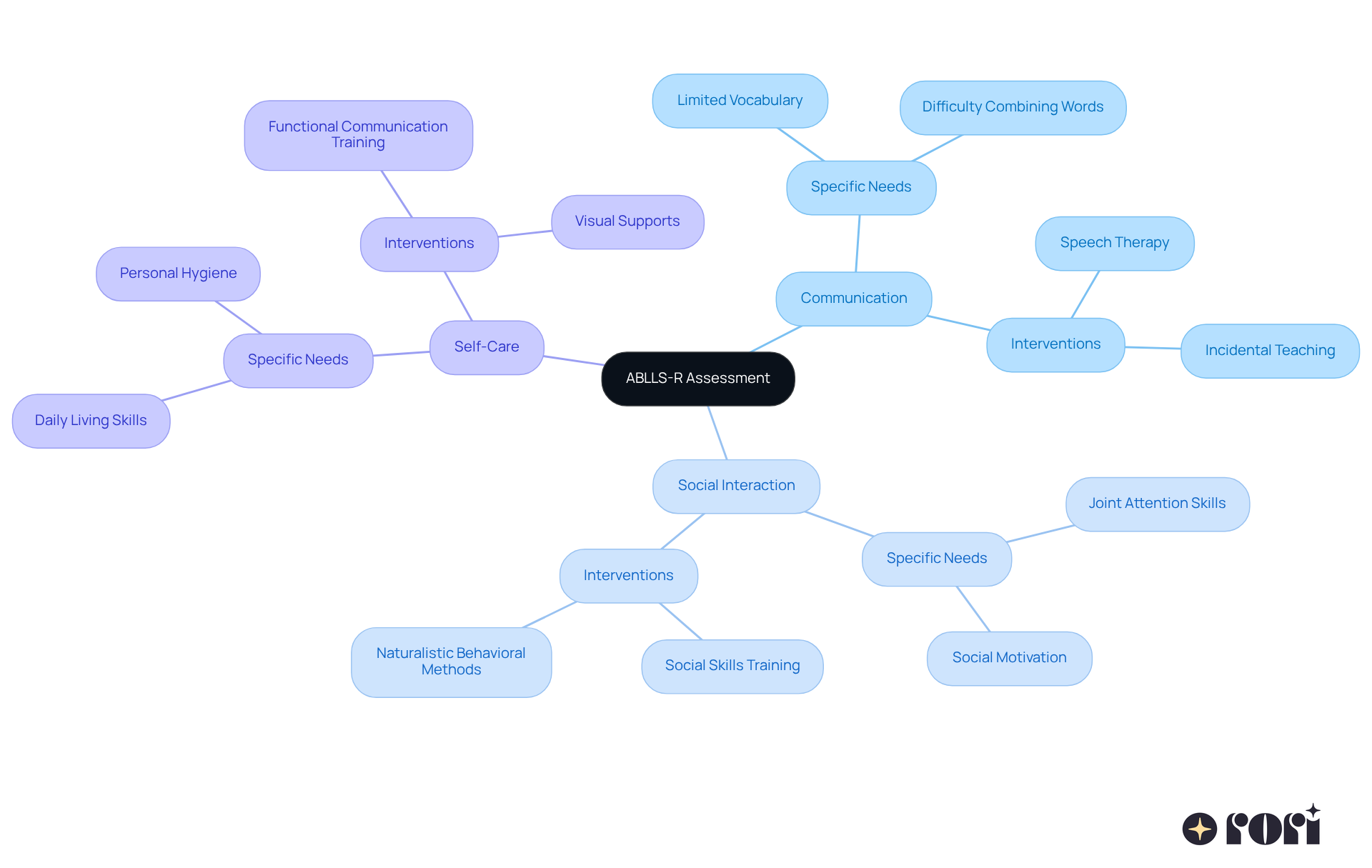
The Verbal Behavior Milestones Assessment and Placement Program (VB-MAPP) is a fantastic tool for tracking verbal growth in individuals with autism. This thorough evaluation looks at a young person's progress across various verbal milestones, giving valuable insights into their communication abilities. By identifying specific strengths and weaknesses, the VB-MAPP helps qualified behavior analysts use evidence-based strategies and tailor interventions that enhance effective communication and social interaction.
This personalized approach not only boosts the young person's ability to connect with others but also significantly supports their overall development. Recent studies show that kids receiving ABA therapy, especially those assessed with the VB-MAPP, demonstrate statistically significant improvements in verbal skills—effect sizes ranging from moderate to high across multiple scales. As Dr. Rachel Boughton wisely points out, 'We must remember that autism isn’t something to be cured; it’s something to be accepted and understood for individuals on the autism spectrum to live fulfilling lives.' This really highlights how important ABA assessment types, including verbal behavior evaluations like the VB-MAPP, are in helping kids with autism thrive in their communication and social interactions.
Parents, don’t hesitate to ask about the VB-MAPP during your consultations with clinicians! It’s a great way to learn how it can enhance your child’s therapy. Plus, the VB-MAPP has a high reliability coefficient, boasting a Cronbach's alpha of 0.972, which further confirms its effectiveness as a reliable assessment tool.
By engaging in this process, caregivers can strengthen their support, make informed choices, and contribute to better behavioral outcomes for their children. Let’s explore this together!
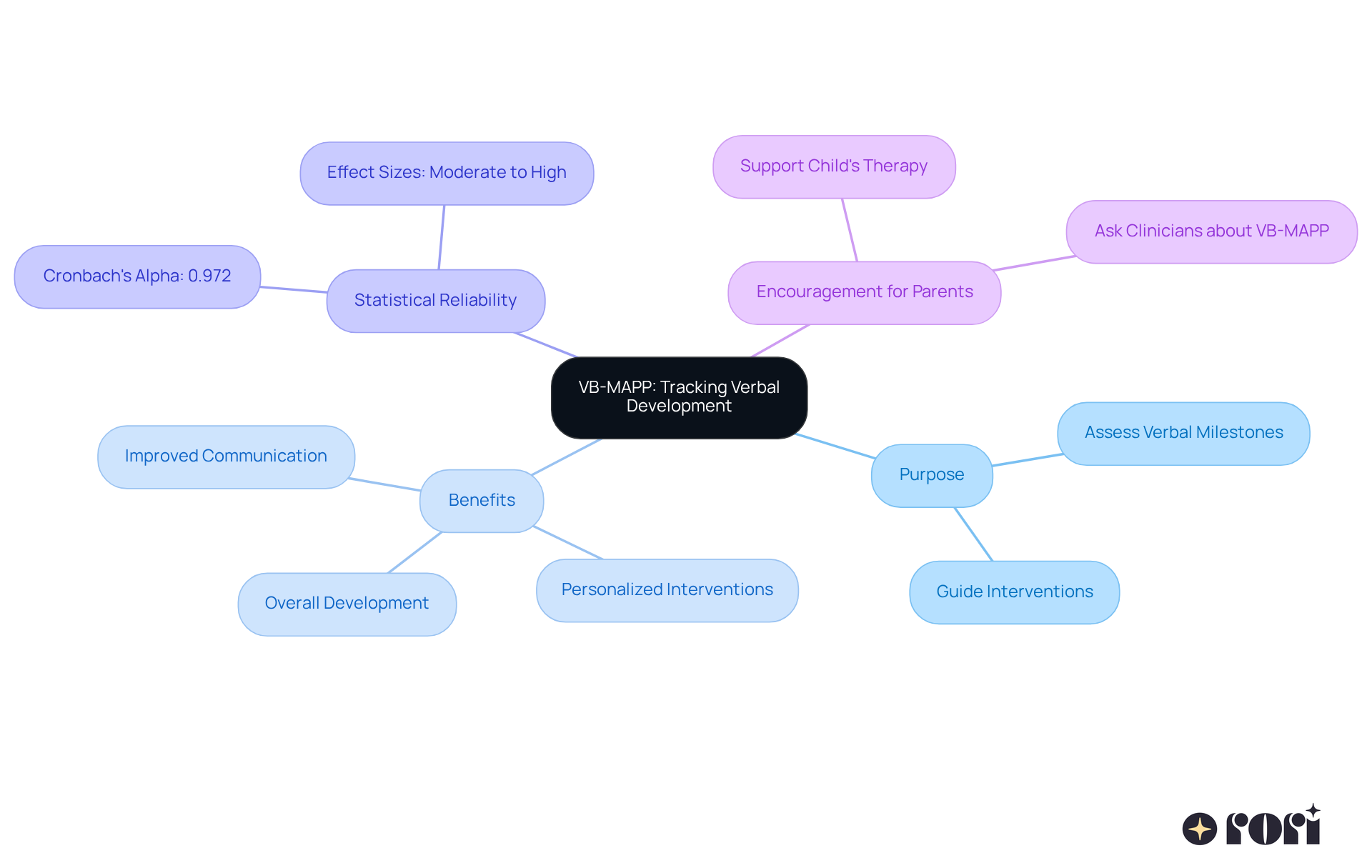
The Assessment of Functional Living Skills (AFLS) is a valuable tool that helps measure how well a young person can handle daily living tasks. This includes everything from self-care to household chores and even getting involved in the community. By pinpointing specific skills that might need a little extra attention, the AFLS allows clinicians to create tailored interventions that support independence.
Many young individuals who engage in AFLS evaluations often experience significant improvements in their ability to manage everyday activities. This not only boosts their confidence but also helps reduce anxiety. It’s a holistic approach that nurtures skill development and promotes emotional well-being, giving young people a sense of control over their lives.
Occupational therapists emphasize the importance of these evaluations for guiding young individuals toward greater autonomy. One therapist shared, "Students need these skills to thrive at home, in the community, and at work." Recent findings highlight how effective AFLS is in supporting autism treatment, demonstrating that structured programs incorporating ABA assessment types can lead to remarkable gains in functional living skills. Ultimately, this can greatly enhance the quality of life for both youngsters and their families.
Let’s explore this together! If you’re a parent looking for ways to support your child’s independence, the AFLS might just be the resource you need.
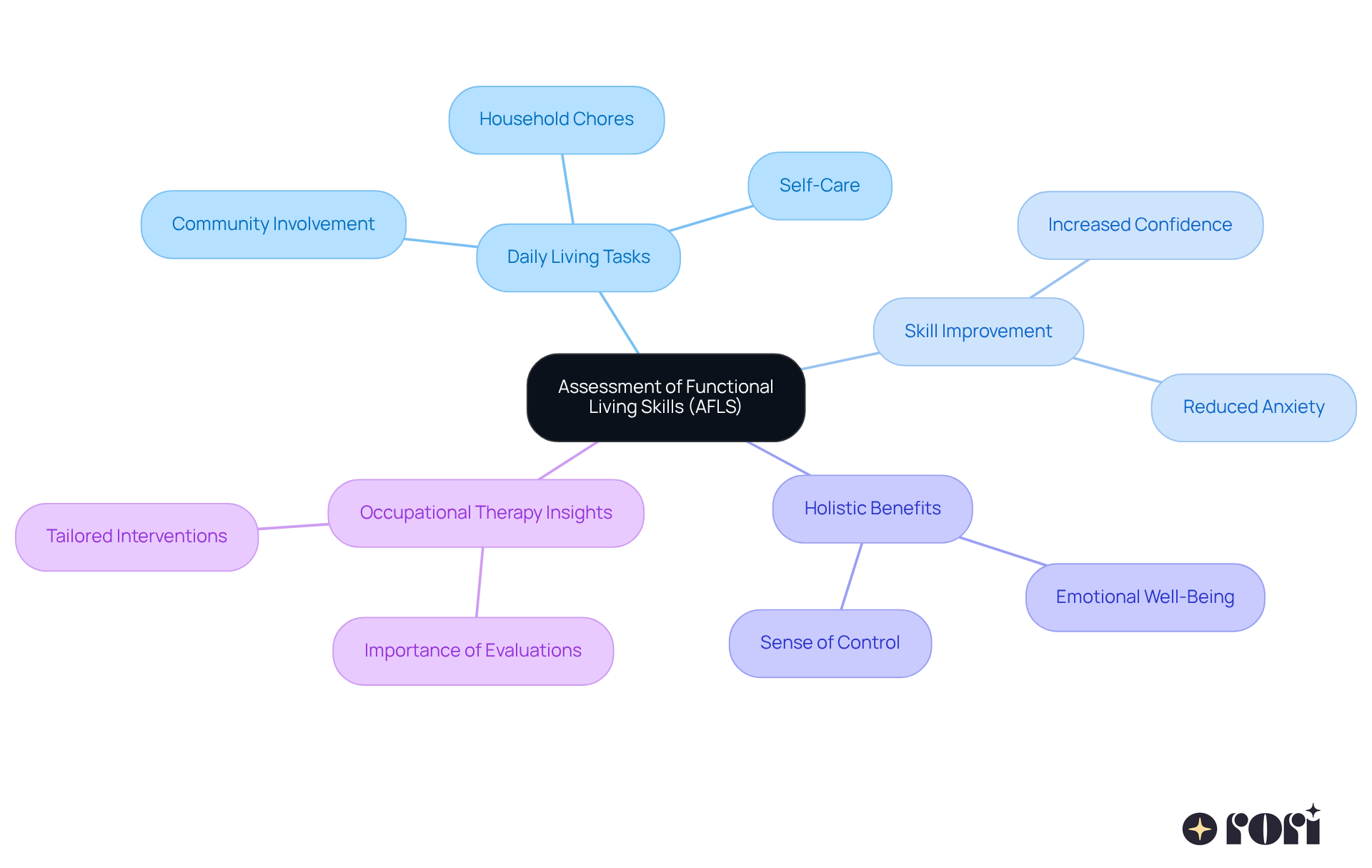
The Vineland Adaptive Behavior Scales (VABS) is a handy tool designed to evaluate different aspects of adaptive behavior, like communication, daily living skills, and socialization. By looking at a young person's adaptive functioning, the VABS gives clinicians valuable insights into areas where support might be needed. This information is crucial for crafting effective interventions that help individuals gain more independence in their daily activities.
Research shows that the VABS has a strong link to cognitive abilities, with a correlation coefficient of 0.76 for IQ in individuals with autism spectrum disorder (ASD). Plus, it’s endorsed by the World Health Organization and the Royal College of Psychiatrists, highlighting its reliability in clinical settings. As professionals remind us, 'Adaptive behavior is the capability to convert cognitive potential into practical abilities.' This really emphasizes how important these evaluations are for fostering meaningful growth.
The VABS not only helps identify specific needs but also encourages the development of personalized strategies that enhance adaptive functioning. Ultimately, this empowers individuals with autism to thrive in their everyday lives. Let’s explore this together and see how we can make a difference!
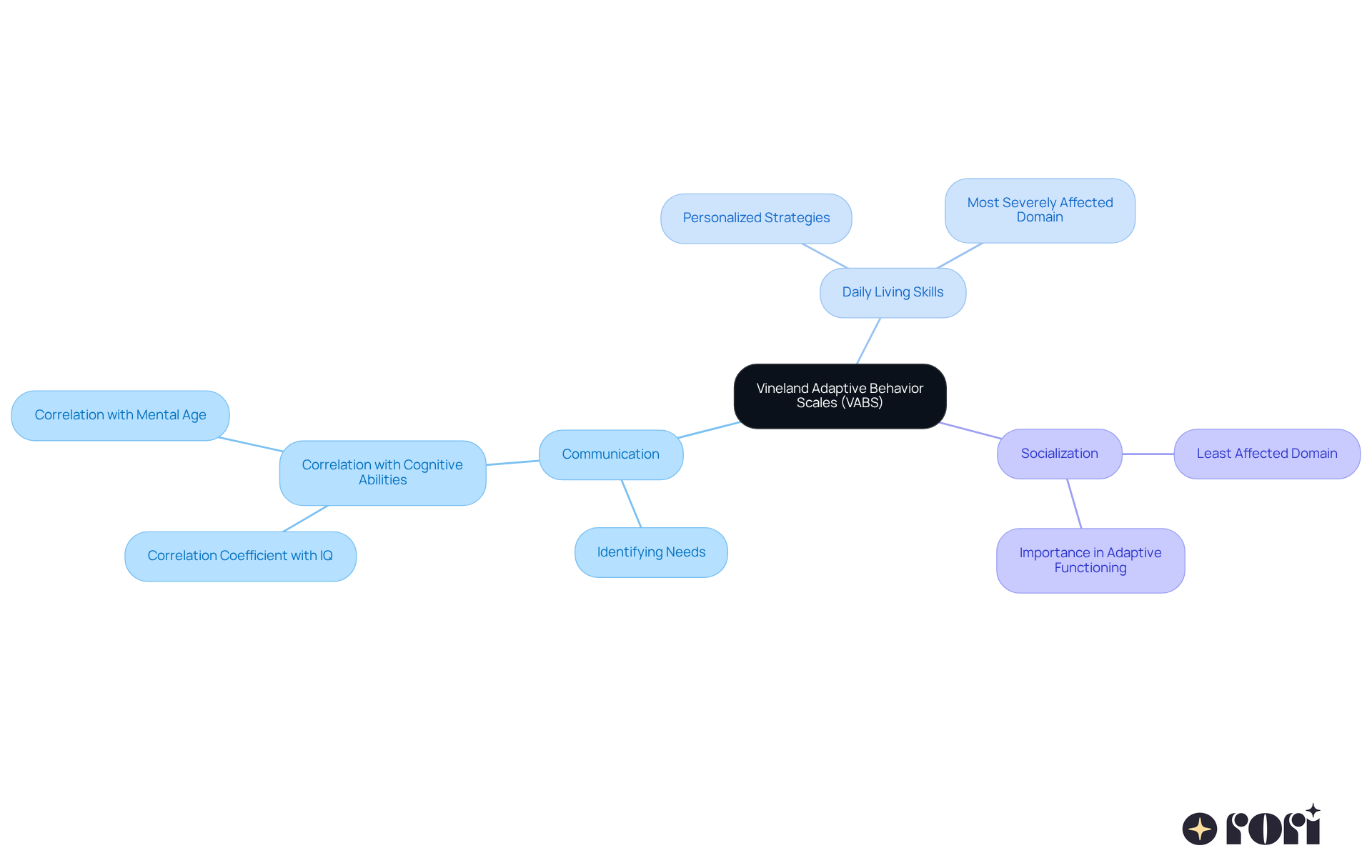
The Promoting Emergence of Advanced Knowledge (PEAK) evaluation is an invaluable tool for measuring advanced learning abilities in individuals with autism. It shines a light on cognitive abilities, problem-solving skills, and the capacity for abstract thinking. Did you know that nearly half of individuals with ASD now have average or above-average intelligence? This really underscores the importance of recognizing these unique cognitive profiles.
At Rori Care, clinicians focus on these advanced abilities to tailor interventions that support higher-level learning and cognitive growth. They use evidence-based strategies that are regularly assessed and adjusted based on each individual's progress. As Emily Simonoff, a Professor of Child and Adolescent Psychiatry, wisely points out, 'Inclusive education can provide social benefits for autistic pupils.' This really emphasizes how effective cognitive evaluations can shape personalized learning strategies.
The PEAK evaluation not only enhances the educational experience for students but also supports their overall growth by fostering critical thinking and adaptive skills. Parents, it's so important to advocate for ABA assessment types, including cognitive assessments like PEAK. Understanding your child's unique cognitive profile can ensure they receive the tailored support they need. At Rori Care, our compassionate clinical leadership is deeply committed to neurodiversity and the success of every child. Let’s explore this together! We're here to help you every step of the way!
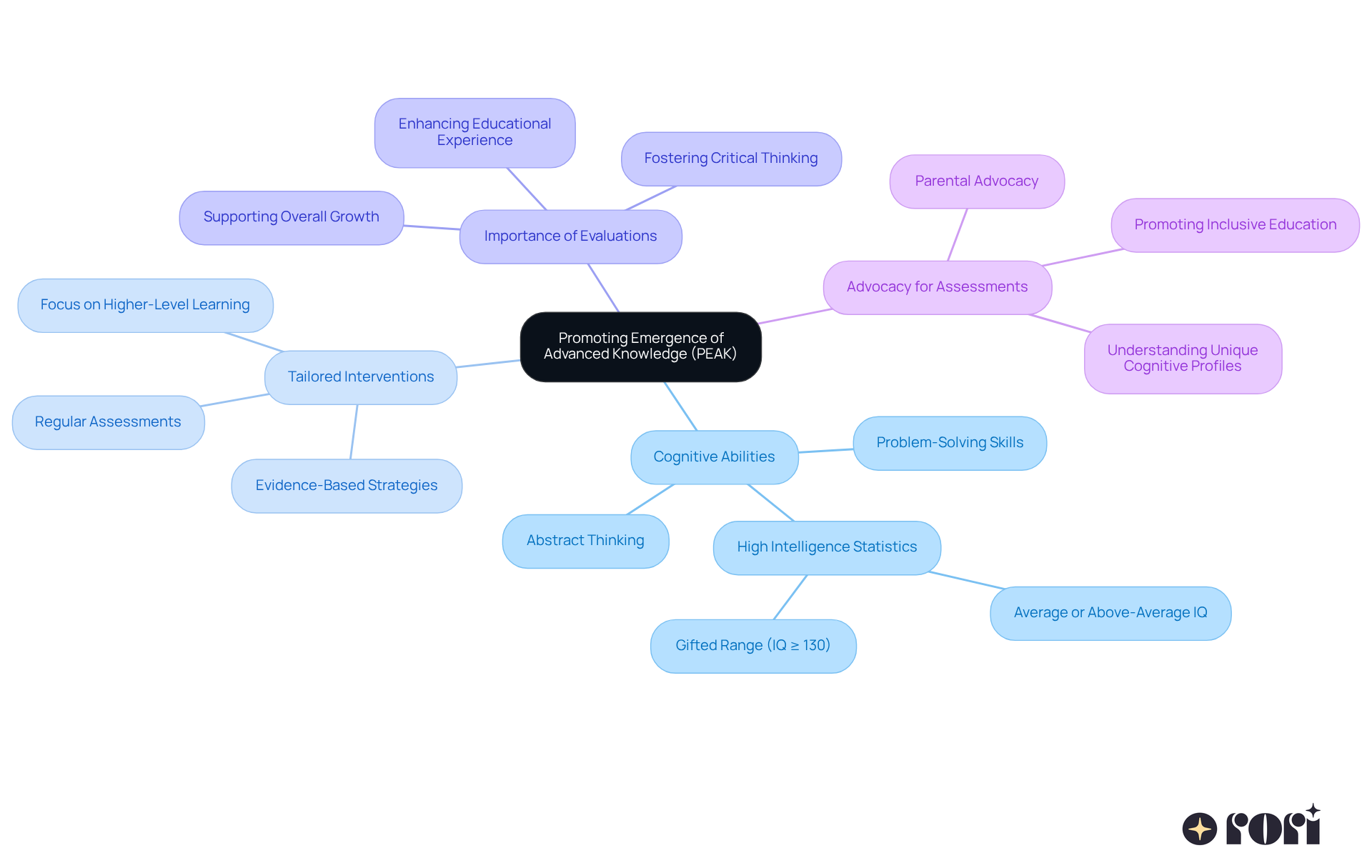
Aba assessment types, including Functional Behavior Assessments (FBAs), are essential evaluations required by the Individuals with Disabilities Education Act (IDEA) that help us understand the reasons behind challenging behaviors in children with autism. By carefully examining what occurs before, during, and after these behaviors, ABA assessment types reveal important insights into what triggers them. This understanding of aba assessment types is vital for crafting effective intervention plans (BIPs) that tackle the root causes, paving the way for positive behavioral changes.
Did you know that interventions based on FBAs can lead to a 90% reduction in challenging behaviors? That’s a significant impact! It really highlights how ABA assessment types can guide treatment decisions. Plus, skilled behavior analysts play a key role in this process. They create personalized plans with measurable goals and evidence-based strategies, making sure that interventions fit each child's unique needs.
A thorough FBA not only informs BIPs but also incorporates various aba assessment types to encourage a proactive approach to managing behavior. It helps us form hypotheses about whether the behaviors are attempts to gain something positive or to escape something negative. In real life, FBAs have been instrumental in developing strategies that improve social interactions and emotional well-being, helping young people thrive in various environments.
Gathering data for FBAs involves various aba assessment types, such as interviews, direct observations, and systematic evaluations, all of which contribute to a comprehensive understanding of behavior patterns. And here’s a neat innovation: incorporating AI-driven progress report automation can enhance the efficiency of ABA therapy, freeing up 50% more time for treatment. This means more focused and effective interventions!
Let’s explore this together! We’re here to help you every step of the way!
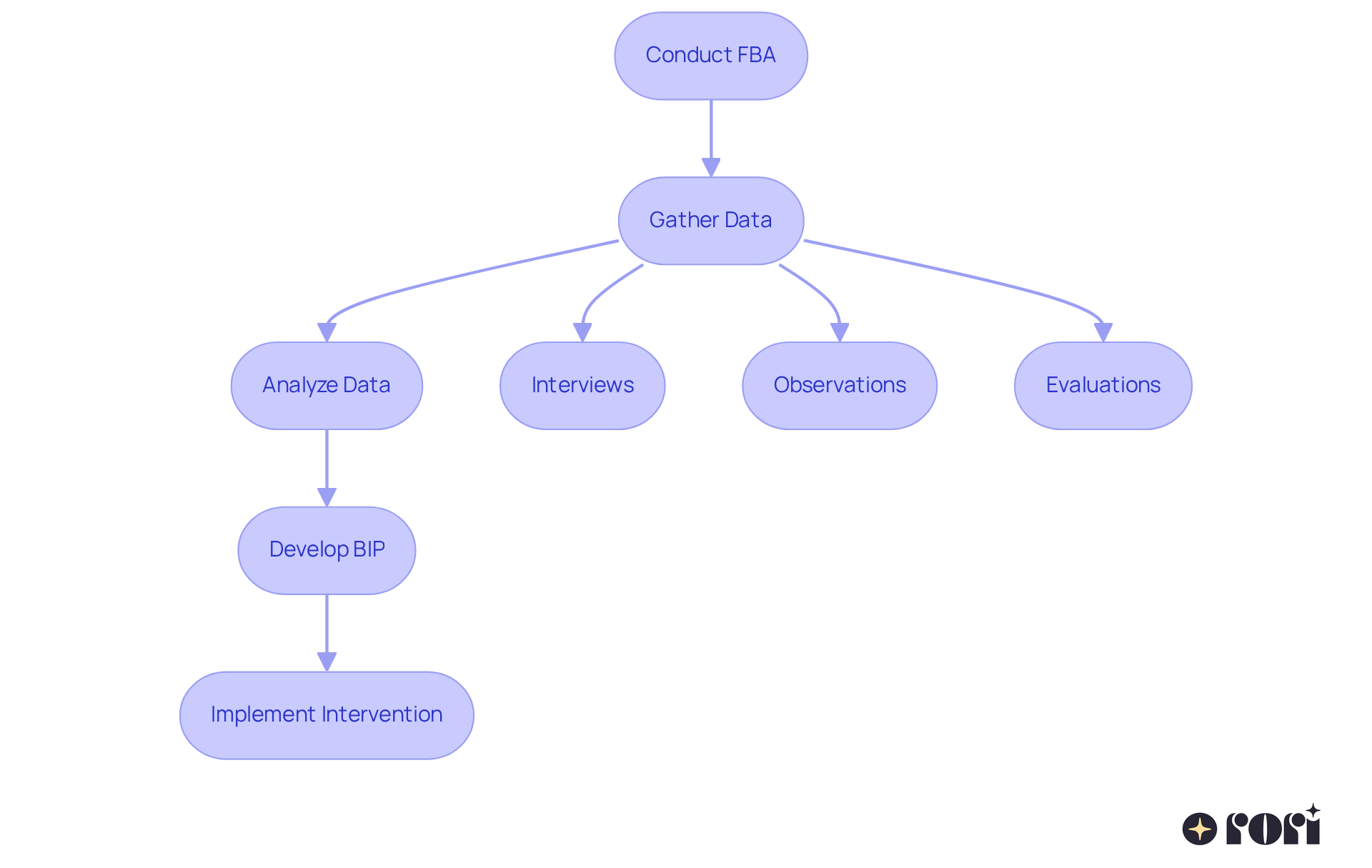
The Early Start Denver Model (ESDM) is a fantastic, evidence-supported approach tailored for young individuals with autism, typically between 12 to 48 months old. What makes this model special is how it blends applied behavior analysis principles with developmental science, creating an environment that encourages early learning and holistic growth.
By taking a close look at a young person’s developmental milestones, ESDM helps clinicians design focused interventions that can really boost cognitive, language, and social skills. Research shows that children who participate in ESDM often experience significant improvements in these areas, with effect sizes of 0.28 for cognitive growth and 0.29 for language abilities. This highlights just how effective ESDM can be in paving positive developmental paths.
Developmental psychologists emphasize the significance of early aba assessment types in the context of autism. They believe that timely interventions can lead to meaningful gains in adaptive behavior and overall functioning, which are evaluated through various aba assessment types. The ESDM not only aids children in reaching their developmental milestones but also empowers families. It provides them with specific strategies and tools, like parent training and involvement in therapy sessions, to nurture their child’s growth and independence.
By enhancing caregiver training, families feel more equipped to offer the right support at home, make informed choices, and actively engage in their loved one’s therapeutic journey. This ultimately leads to better behavioral outcomes and a more connected family dynamic. Let’s explore this together and see how ESDM can make a difference for your family!
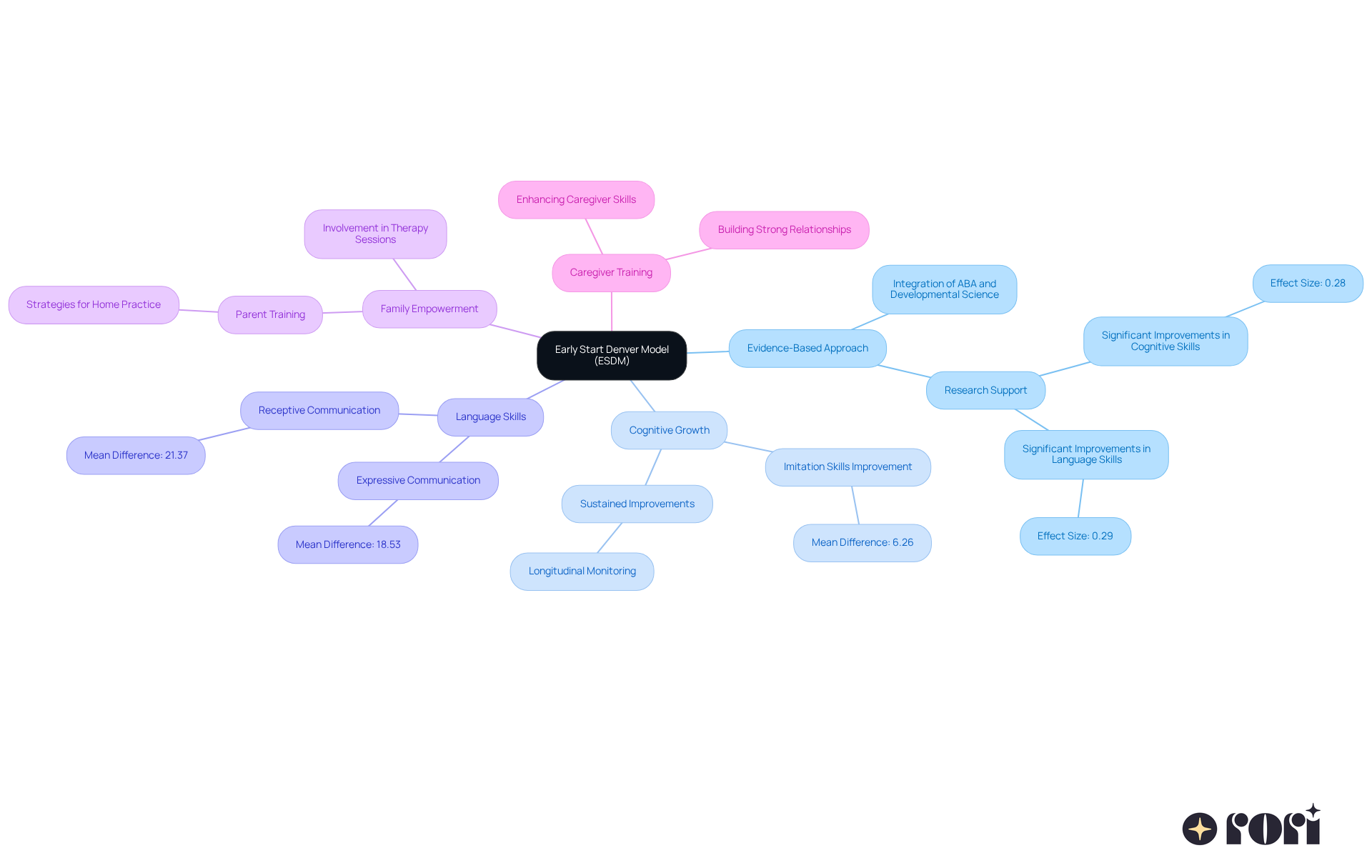
Essential for Living (EFL) is a fantastic program designed to empower individuals with moderate to severe disabilities, including autism, by helping them develop essential functional life skills. It focuses on key areas like communication, self-care, and social interaction—skills that are so important for everyday living. By assessing a child's current abilities and identifying specific areas for growth, EFL helps clinicians create personalized interventions that not only promote independence but also enhance the child's overall quality of life.
With over 3,100 practical life skills included in the curriculum, EFL takes a comprehensive approach to development. Recently, there’s been a wonderful trend recognizing the importance of leisure skills, which are now part of the framework. This addition helps individuals build the competencies necessary for a fulfilling life. Clinicians emphasize that teaching these essential skills is crucial for individuals with autism, as it lays the foundation for managing daily situations effectively.
Real-world applications of EFL showcase its effectiveness in various settings. Practitioners use evidence-based strategies to uplift the dignity and quality of life for their clients. By focusing on practical skills that enable access to enjoyable activities and social interactions, EFL not only prepares children for immediate challenges but also equips them for future independence. Let’s explore this together!
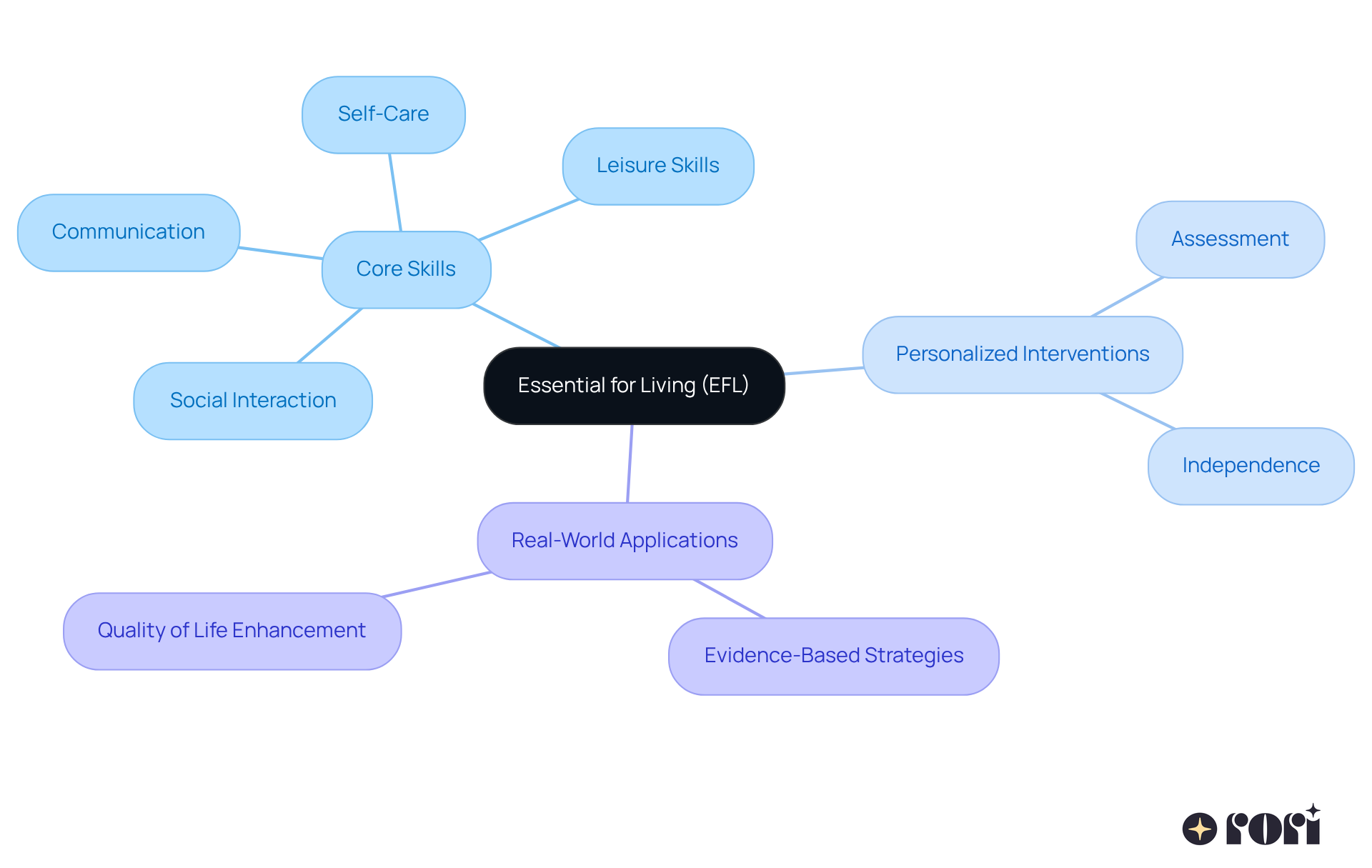
The Parenting Stress Index (PSI-4) is a helpful tool designed to understand the stress that parents of children with autism often experience. It looks at various factors contributing to this stress, such as your child's unique traits and your own parenting practices. By highlighting those high-stress areas, the PSI-4 helps both clinicians and families grasp the underlying dynamics, paving the way for strategies that support parents. This ultimately nurtures a healthier family environment and boosts the overall well-being of both parents and children.
Moreover, incorporating caregiver education into the various ABA assessment types is a game changer! It equips parents with essential knowledge and strategies, enhancing their ability to provide effective support at home. This aligns beautifully with the individualized ABA assessment types developed by qualified behavior analysts. When caregivers understand ABA principles and actively engage in their child's therapy, they can make informed choices that lead to better behavioral outcomes and reduced stress. This creates a more supportive atmosphere for their child's development.
Let’s explore this together! Remember, you’re not alone on this journey—there are resources and support systems ready to help you every step of the way!
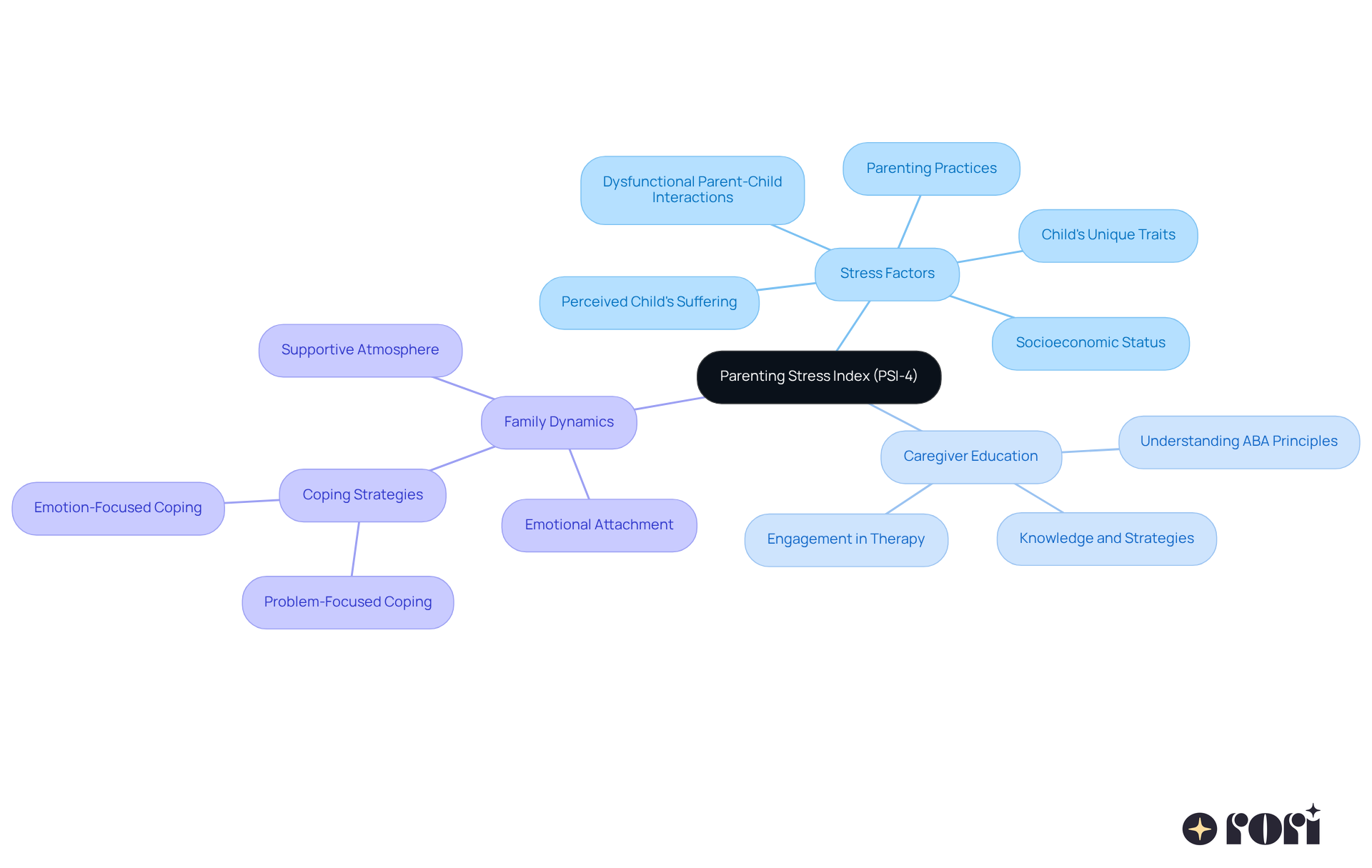
Understanding the various ABA assessment types is so important for parents navigating the complexities of autism therapy. These assessments are like foundational tools, helping clinicians tailor interventions that meet each child’s unique needs. By taking a comprehensive approach, parents can ensure their children receive personalized care that truly fosters growth in communication, social skills, and daily living competencies.
Throughout this article, we’ve highlighted key assessments like the ABLLS-R, VB-MAPP, and AFLS for their specific roles in evaluating language proficiency, tracking verbal development, promoting functional living skills, and understanding behavior triggers. Each assessment not only offers valuable insights into a child’s abilities but also helps create targeted strategies that can lead to significant improvements in their overall quality of life. Plus, with innovative tools like AI-driven progress reporting, we can enhance the effectiveness of these assessments, allowing for more focused and effective interventions.
Ultimately, embracing these essential ABA assessment types empowers parents to actively participate in their child’s therapeutic journey. By advocating for personalized evaluations and interventions, caregivers can cultivate an environment where children with autism can truly thrive. This collaborative approach not only supports individual growth but also strengthens family dynamics, creating a more supportive atmosphere for everyone involved.
Let’s explore this together! Remember, you’re not alone in this journey, and we’re here to help you every step of the way!
What is Rori Care's approach to ABA therapy?
Rori Care utilizes extensive ABA assessment types to gather insights about a child's behavior, abilities, and unique needs. This multifaceted evaluation process allows clinicians to create personalized treatment plans that enhance the effectiveness of interventions, leading to meaningful improvements in overall development and well-being.
What is the success rate of ABA therapy for individuals with ASD?
ABA therapy has an impressive success rate of over 89% in supporting individuals with Autism Spectrum Disorder (ASD).
How does Rori Care ensure that therapy evolves with the individual's needs?
Rori Care employs evidence-based strategies combined with ongoing assessment and adjustment, ensuring continuous monitoring that is key to achieving optimal results.
What is the ABLLS-R and its purpose?
The Assessment of Basic Language and Learning Skills - Revised (ABLLS-R) is an ABA assessment tool used to evaluate language skills in children with autism. It identifies specific needs in areas like communication, social interaction, and self-care to create targeted interventions that boost language development and learning outcomes.
How does the ABLLS-R impact language development?
Research shows that children who undergo ABLLS-R evaluations often see significant improvements in communication skills, with many reaching average language proficiency by age 11, highlighting the importance of early identification and intervention.
What updates are expected for the ABLLS-R in 2025?
Updates to the ABLLS-R in 2025 will reflect new insights into language development in children with autism, aiming to make the evaluation process more relevant and effective in addressing their unique challenges.
What is the VB-MAPP and how is it used?
The Verbal Behavior Milestones Assessment and Placement Program (VB-MAPP) is a tool for tracking verbal growth in individuals with autism. It evaluates a child's progress across verbal milestones, helping behavior analysts tailor interventions that enhance communication and social interaction.
What evidence supports the effectiveness of the VB-MAPP?
Recent studies indicate that children receiving ABA therapy, especially those assessed with the VB-MAPP, show statistically significant improvements in verbal skills, with effect sizes ranging from moderate to high across multiple scales.
What is the reliability of the VB-MAPP?
The VB-MAPP has a high reliability coefficient, boasting a Cronbach's alpha of 0.972, confirming its effectiveness as a reliable assessment tool.
How can parents engage with the assessment process?
Parents are encouraged to ask about the VB-MAPP during consultations with clinicians to learn how it can enhance their child's therapy and contribute to better behavioral outcomes.